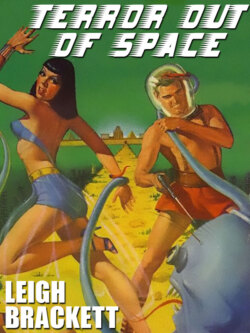Читать книгу Terror Out of Space - Leigh Brackett - Страница 5
На сайте Литреса книга снята с продажи.
INTRODUCTION
ОглавлениеLeigh Douglass Brackett (1915–1978) was an American science fiction writer, dubbed the “Queen of Space Opera” because of her richly developed planetary romance tales, which borrowed a bit from Edgar Rice Burroughs’s “Mars” series, but were uniquely her own. Her solar system had both Mars and Venus as habitable worlds, with interplanetary travel and trade.
Born in Los Angeles, California, she grew up there, where she discovered science fiction and made friends with local members of the Los Angeles Science Fiction Society (LASFS), most notably Ray Bradbury. With Bradbury’s encouragement, Brackett polished her writing skills and soon began to sell to the science fiction magazines of the day. He first published story was “Martian Quest” in the February, 1940 issue of Astounding Science Fiction.
Her earliest years as a writer, 1940-1942, were her most productive. Some of her stories have social themes, such as “The Citadel of Lost Ships” (1943), which considers the effects on the native cultures of alien worlds of Earth’s expanding trade empire. During this period, she was also an active member of LASFS, and participated in local science fiction fandom, including contributing to the second issue of Pogo’s STF-ETTE, an all-female science fiction fanzine (probably the first such).
Her first novel, No Good from a Corpse (1944), had already appeared by this time. It was a hard-boiled mystery novel in the tradition of Raymond Chandler, and its success resulted in her first screenwriting assignment. After this, Brackett’s science fiction stories became more ambitious. Shadow Over Mars (1944) was her first novel-length science fiction story; though somewhat rough-edged, it marked the beginning of a new style, one strongly influenced by 1940s detective stories and film noir.
In 1946, Brackett married fellow science fiction author Edmond Hamilton (Ray Bradbury served as best man). After their marriage, Brackett took a break from screenwriting. When she returned to it in the mid-1950s, she wrote for TV and movies. Howard Hawks hired her to write or co-write several John Wayne pictures, including Rio Bravo (1959), Hatari! (1962), El Dorado (1966), and Rio Lobo (1970). Because of her background with The Big Sleep, she later adapted Raymond Chandler’s novel The Long Goodbye for the screen. She even worked on an early draft of The Empire Strikes Back (1980), elements of which remained in the film, for which she received screen credit. Unfortunately, she died before the film went into production.
Her accomplishments also included being the first woman shortlisted for the Hugo Award.
—John Gregory Betancourt
Cabin John, Maryland
